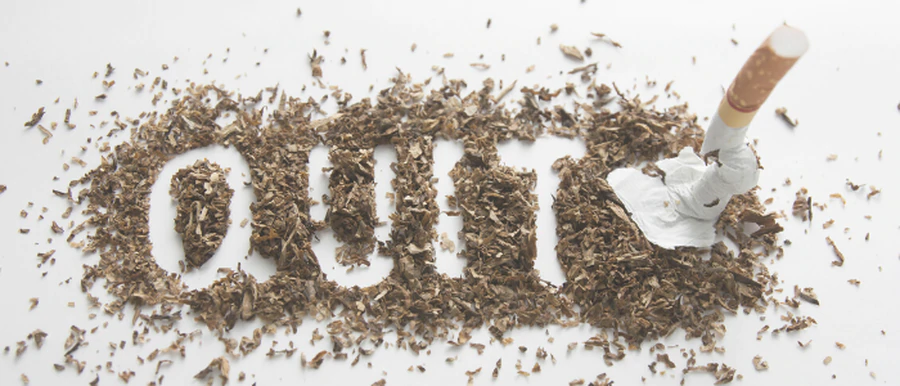
A lot of people rightly believe that smoking harms the lungs, but where they may be misled is in believing this damage is irreversible. This may be true in the sense that there is some structural damage that cannot be undone. However, a smoker’s lung function can exponentially increase once they quit smoking. If you’re a smoker interested in understanding how quitting can change your life, here’s everything you need to know.
The milestones of an ex-smoker: How your body changes when you quit smoking.
20 minutes after your last cigarette.
Yep, things can change that quickly! Just 20 minutes after your last cigarette, your blood pressure and pulse start to return to normal levels. Fibers in your bronchial tubes will start to move more efficiently in their effort to clear bacteria or other irritants out of the lungs.
8 hours after your last cigarette.
Carbon monoxide is a chemical that you may be aware is present in cigarette smoke. Carbon monoxide starts to replace oxygen particles in your blood, lowering oxygen absorption in your tissues. 8 hours post your last cigarette, carbon monoxide levels start to go back to normal. Oxygen deprived tissues and blood vessels start to receive much-needed oxygen.
A day after your last cigarette.
Smoking can lower good cholesterol, which makes aerobic exercise harder to do. This, in turn, increases the risk of coronary heart disease. It also increases blood pressure and blood clots, increasing the risk of strokes. However, just 24 hours after your last cigarette, your blood pressure starts to drop, reducing the risk of heart disease and stroke. Your oxygen levels will also rise, making aerobic activity easier. Nicotine levels in your blood would reduce to negligible amounts by this time.
Two days after your last cigarette.
Smoking can damage nerve endings responsible for tasting and smelling. Just 48 hours after your last cigarette, these nerve endings start to heal, and you may notice a heightened sense of smell and taste.
Three days after your last cigarette.
Three days post your last cigarette will be a bittersweet moment. You’ll find it easier to breathe as your bronchial tubes start to relax and open up more. Your lung capacity (which is the ability of the lungs to fill up with air) will have increased. Nicotine levels in your body will have completely depleted, and while that is a wonderful thing, most people experience cravings, irritability, and other withdrawal symptoms as the body readjusts..
One week after your last cigarette.
If you’ve managed to stay off cigarettes for a week, good job! Smokers who make it to the one-week mark are nine times as likely to quit for good.
Two weeks after your last cigarette.
Two weeks post your last cigarette, you’ll notice that you aren’t just breathing better, you can also move better. Your blood circulation and blood oxygen levels both improve around this time. Your lung function could increase by a whopping 30% by this point!
One month after your last cigarette.
At this point, you’ll definitely feel more energetic. More importantly, you’ll notice the absence of many chronic smoker’s conditions, like repeated sinus congestion and shortness of breath. Remember the fibers in the bronchial tubes we talked about earlier? You start creating more of those, and the benefits will be in reduced infection and phlegm.
Three months after your last cigarette.
People with mild-moderate Chronic Obstructive Pulmonary Disease or COPD will continue to experience improvements in their lung function past the 3-month mark. It is also around this time that a woman’s fertility improves, and the risk that her baby will be born prematurely reduces.
Six months after your last cigarette.
After 6 months of no cigarettes, you’ll likely find that your cravings have greatly reduced, even when confronted by situations in which you would have reached for a cigarette in the past. Better still, you’ll find that you’re coughing up much less phlegm, thanks to your airways healing from the constant inflammation.
Nine months after your last cigarette.
At the nine-month mark, the fibers in your lungs have completely healed from cigarette consumption. You’ll find an even greater reduction in lung infections since these fibers are performing at their best.
One year after your last cigarette.
Your lung capacity when you exercise or exert yourself will be noticeably different. You’ll cough a lot less. At this point, your risk for coronary heart disease decreases by half.
Three years after your last cigarette.
In three years, your risk of having a heart attack is now the same as a non-smoker’s, due to your blood vessels and arteries recovering and lowering your risk of clots and high blood pressure. Your risk of having a stroke has also significantly decreased.
Five years after your last cigarette.
Your arteries and blood vessels have continued to widen, further lowering your risk of clots and therefore strokes. This risk will continue to reduce over the next 10 years. At this stage, your risk of death by lung cancer has dropped by half compared to your smoking days.
10 years after your last cigarette.
Well first of all, if you’ve made it to 10 years, you should be incredibly proud of yourself! Your risk of developing a whole host of cancers, including mouth, lung, and bladder cancer has reduced.
15 years after your last cigarette.
Your risk of having a heart attack or stroke is the same as someone who’s never smoked before – and the same for coronary heart disease and pancreatic cancer.
If you're planning to quit smoking, the best time to do it is... right now. If you want a handy graphic that tells you why, check out our infographic below!

